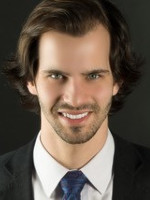Gerard Weber

Musicology
Email: gweber3@uwo.ca
Gerard Weber is a PhD candidate in Musicology whose research interests include the Song of Songs biblical text and its intersection with music, medieval and renaissance rhetoric, notation, performance, and analysis, as well as twentieth-century music and aesthetics. Gerard received his Bachelor of Music Honours degree from the University of Saskatchewan (2013) and earned a Master of Music degree from the University of Florida (2015).
As a concert saxophonist, Gerard has performed as a soloist and chamber musician in Canada, the United States, Germany, Switzerland, and the Netherlands. A few highlights of Gerard’s musical achievements include the first place winner of the woodwind category at the 2012 National Music Festival Competition of Canada, winner of the 2013 Shurniak Concerto Competition, and winner of the 47th Annual University of Florida Concerto Competition.
As a member of the North American Saxophone Alliance, Gerard performed in the 2013, 2017, and 2019 Region IX Conferences, the 2014, 2016, and 2018 Biennial Conferences, and the 2015 Region XI Conference. Musicological presentations include a research project on the incorporation of classical and medieval rhetoric as performance practice for saxophonists (NASA 2013 Region IX Conference) and a contextualization of the musical instrument innovations of Adolphe Sax (Adolphe Sax 2014 Bicentennial Celebration, University of Florida).
In 2019, Gerard was invited to contribute to a volume specifically celebrating the life and compositions of Canadian composer Murray Adaskin, titled “The Vision of Murray Adaskin (1906-2002): His Contributions to the Musical Scene of Canada and Beyond” (edited by Eli Bornstein, Sheila Kreyszig, and Walter Kreyszig, publication forthcoming). The title of Gerard’s contribution is “A ‘Distinctly Canadian’ Composer: Personification and Self-Identification in the Woodwind Quintets of Murray Adaskin (Victoria, British Columbia, 1974 & 1993; Adaskin Nos. 21 & 22).”

